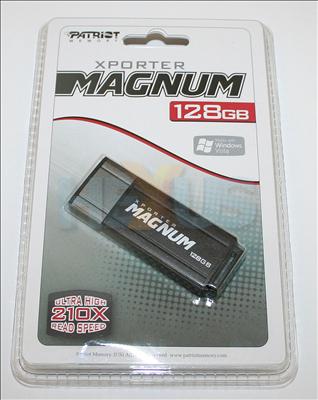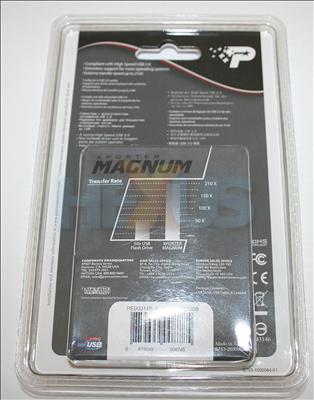128GB in a chewing-gum packet
In essence, all USB pen-drives (aka flash drive) are the pretty similar. They use multi-level-cell NAND flash memory that interfaces with a USB controller and, obviously, connector. Because there are no moving parts inside, USB pen-drives are less susceptible to damage, and manufacturers have created wear-resistant bodies on certain models. Naturally, they share common technology with solid-state drives (SSDs).As NAND flash has become denser, capacities have risen to the extent where, right now, 64GB drives are considered large. Better drives also use faster NAND chips that are capable of saturating the real-world USB 2.0 read-speed of 35MB/s. Top-of-the-line USB drives are fast and capacious.
Patriot's Xporter Magnum ships with either 64GB or 128GB capacities. Like most facets of computing, you pay exponentially more for the very fastest/largest product, and the 128GB Xporter Magnum weighs in at around £290, which is 3x the price of the half-capacity 64GB model.
Such models are more proof of technology than viable commercial options for most people. As capacities rise further - to 256GB and beyond - the pricing of these drives will come down, quickly.
Complying with convention, Patriot labels the drive up as a 128GB model. The capacity is derived from using a decimal (SI) system, where 128GB equates to 128,000,000,000 bytes. Microsoft Windows uses a binary system for file sizes, derived in powers of two, such that 128GB (decimal) 'formats' down to around 119.2GiB. It's a little more complicated than that, even, as manufacturers tend to keep some capacity back for wear-levelling. The bottom line is that the drive provides around 120GB of Windows-usable space.
On to more simple matters, as usual, the plastic packaging is a pain to get into.
Patriot states an ultra-high read-speed of 210x, where the base throughput is calculated by the transfer speed of a CD-R disc - 150KB/s (well, 150KiB/s). Knowing this, Patriot's drive should read at a peak 31.5MB/s. Write speed is always lower and not often quoted on documentation.











